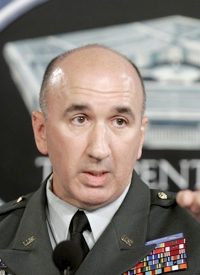
USA Today reported on September 2 that Iraq is preparing to buy as much as $13 billion in U.S. arms and military equipment. The report cited U.S. officials who said the large purchase of tanks, ships, and military hardware is an indication that Iraqi-U.S. military ties will remain close for years to come.
The report quoted Army Lt. Gen. Michael Barbero (left), identified as the ranking U.S. officer responsible for training and advising Iraqi forces, who stated: "[The arms purchase] helps to build their capabilities, first and foremost; and second, it builds our strategic relationship for the future.”
Barbero noted of the purchase: "It’s going to be a modern and fairly sophisticated military." Among the items included will be up to 140 M-1 Abrams battle tanks, the 68-ton main battle tank used by the U.S. military.
USA Today also noted:
In addition to the $13 billion purchase, the Iraqis have requested 18 F-16 Falcon fighter jets as part of a $3 billion program that also includes aircraft training and maintenance. If approved by Congress, the first aircraft could arrive in spring 2013. Under the plan, the first 10 pilots would be trained in the U.S.
An interesting commentary about the arms sale appeared online at AllVoices.com, which explored the continual U.S. effort to balance Iraqi and Iranian influence in the region:
No doubt the U.S. is hoping to arm Iraq as a means of offsetting the regional power of Iran even though any new government is likely to be dominated by Shia politicians who will want good relationships with Iran. There is no Saddam Hussein to support any longer as the U.S. did in the war between Iran and Iraq. By turfing out Hussein and bringing a form of majority rule in Iraq the U.S. has almost certainly ensured a greater role for Iran in Iraqi governance. [Emphasis added.]
We noted in our article posted on September 1, “Britain’s Blair Reflects on Iraq War,” citing Wikipedia as a source:
During the [1980-1988] war [between Iraq and Iran], Iraq was regarded by the West (and specifically the United States) as a counterbalance to post-revolutionary Iran. The support of Iraq took the form of technological aid, intelligence, the sale of dual-use and military equipment and satellite intelligence to Iraq.
After having invested so much in building Saddam Hussein into an effective thorn in militant, post-revolutionary Iran’s side, logic would seem to dictate that — whatever his faults — we would leave him in place. Now, having spent over 4,000 lives and almost $750 billion in removing Saddam and trying to rebuild Iraq’s infrastructure, we find that the most notable result of our efforts has been to bolster Iran’s influence!
Of course, our government pursued an equally illogical policy in Iran years back, first helping the pro-Western Shah Mohammad Reza Pahlavi overthrow Iran’s Prime Minister, Mohammed Mossadegh in 1953, and then helping to force him from power in 1979, to be replaced with anti-Western clerics!
Such a disjointed foreign policy contradicts the sage advice given by our first President, George Washington, in his 1796 farewell address, in which he stated the following principles:
• Observe good faith and justice towards all nations; cultivate peace and harmony with all.
• In the execution of such a plan, nothing is more essential than that permanent, inveterate antipathies against particular nations, and passionate attachments for others, should be excluded; and that, in place of them, just and amicable feelings towards all should be cultivated. The nation which indulges towards another a habitual hatred or a habitual fondness is in some degree a slave.
• So likewise, a passionate attachment of one nation for another produces a variety of evils. Sympathy for the favorite nation, facilitating the illusion of an imaginary common interest in cases where no real common interest exists, and infusing into one the enmities of the other, betrays the former into a participation in the quarrels and wars of the latter without adequate inducement or justification.
• Excessive partiality for one foreign nation and excessive dislike of another cause those whom they actuate to see danger only on one side, and serve to veil and even second the arts of influence on the other. Real patriots who may resist the intrigues of the favorite are liable to become suspected and odious, while its tools and dupes usurp the applause and confidence of the people, to surrender their interests.
• The great rule of conduct for us in regard to foreign nations is in extending our commercial relations, to have with them as little political connection as possible. So far as we have already formed engagements, let them be fulfilled with perfect good faith. Here let us stop.
Considering Washington’s admonitions, as well as the language in our Constitution that gives only Congress the power to declare war — a power it has not utilized since 1941 — what actions could the United States now take that are best in harmony with the intent of our Founding Fathers?
The first order of business, obviously, is to remove all U.S. troops from areas where they are not engaged in their constitutional prerogative of protecting our states agains invasion. If the sale of military equipment to Iraq, enabling it to defend itself, will facilitate that mission, it does not seem that Washington would have objected. He did say that “So far as we have already formed engagements, let them be fulfilled with perfect good faith."
But he also added: “Here let us stop.”
Afghanistan comes to mind.
Photo: Gen. Michael Barbero during a press briefing on U.S. operations in Iraq, Aug. 23, 2006 at the Pentagon: AP Images



